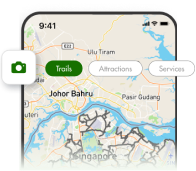- NParks awarded Asia Environmental Enforcement Recognition of Excellence (AEEE) 2024-2025, for cross-border collaboration in tackling illegal wildlife trade
Singapore, 20 October 2025 – As part of efforts to stamp out illegal wildlife trade in Singapore, the National Parks Board (NParks) successfully carried out a series of coordinated raids across Singapore on 9 October 2025. These operations targeted individuals suspected of engaging in illegal wildlife trade through online platforms, including Telegram.
A total of six premises were raided, resulting in the seizure of 16 wildlife specimens. Among the confiscated animals were endangered species listed under the Convention on International Trade in Endangered Species of Wild Fauna and Flora (CITES) such as yellow-headed day geckos, a Leopard Tortoise, a spiny-tailed monitor and an Argentine Black and White Tegu. The animals are currently being housed and cared for at NParks’ Centre for Wildlife Rehabilitation. Individuals involved were interviewed in connection with illegal wildlife sales, and investigations are currently ongoing.
These enforcement efforts complement NParks’ border surveillance operations by extending the fight against illegal wildlife trade into domestic physical and online marketplaces. Through regular monitoring and targeted actions, NParks ensures that offenders are held accountable across all fronts.
NParks, CAD and AGC awarded Asia Environmental Enforcement Recognition of Excellence
NParks takes a zero-tolerance stance on the illegal trade in wildlife. In recognition of its enforcement efforts, NParks, the Commercial Affairs Department of the Singapore Police Force, and the Attorney-General’s Chambers were jointly awarded the Asia Environmental Enforcement Recognition of Excellence (AEEE) on 17 October 2025, coordinated by the United Nations Environment Programme. This accolade recognised NParks’ cross-agency collaboration with the Singapore Police Force, Attorney-General’s Chambers, and the Directorate for Priority Crime Investigation - South African Police Services (SAPS) for the case involving Singapore’s largest-ever seizure of rhinoceros horns, valued at over S$1.2 million.
In October 2022, 20 pieces of rhinoceros horns weighing over 34kg were intercepted at Singapore Changi Airport by NParks and airport security, with support from NParks’ K9 Unit. The horns were discovered in two pieces of baggage belonging to a South African national who was travelling from South Africa to the Lao People’s Democratic Republic through Singapore. The individual was arrested, and the rhinoceros horns were seized by NParks.
Minister of State for Trade and Industry and National Development, Mr Alvin Tan, said “I congratulate NParks and its partners on receiving the Asia Environmental Enforcement Recognition of Excellence award. This honour recognises NParks’ firm commitment to tackling illegal wildlife trade, which poses serious risks to both animal welfare and public health. I thank our partners – the Attorney-General’s Chambers, the Commercial Affairs Department of the Singapore Police Force, and the South African Police Services – for their close collaboration that helped to intercept the activities of the transnational criminal networks involved. The successful conviction of the offender to two years’ imprisonment is the heaviest sentence meted out in Singapore to date for a case involving the smuggling of wildlife parts. This underscores the importance of our Whole-of-Government approach and international cooperation in combating illegal wildlife trade.”
Zero-tolerance approach to illegal wildlife trade
Illegal wildlife trade threatens the survival of endangered species and contributes to habitat destruction around the world. Singapore is a signatory to the Convention on International Trade in Endangered Species of Wild Fauna and Flora (CITES) and is committed to international efforts to combat illegal wildlife trade to ensure the long-term survival of these animals.
These enforcement actions reflect NParks’ firm commitment to tackling illegal wildlife keeping and trade. NParks takes such offences seriously and will not hesitate to act against offenders, regardless of the type and number of animals being smuggled. The illegal trade of wildlife, including non-CITES species, is regulated under the amended Wildlife Act. Under the Wildlife Act, a person must not offer for sale, sell or export any wildlife (whether alive or dead), or any part of a wildlife, unless the person has the Director -General’s written approval to do so. Any individual found to have violated the laws may be fined up to S$50,000, jailed up to two years, or both.
Under the Endangered Species (Import and Export) Act, individuals found guilty of illegally importing CITES Appendix I specimens face fines of up to S$100,000 per specimen (not exceeding an aggregate of S$500,000 or the market value of all specimens at the material time, whichever is higher) and imprisonment of up to six years. For Appendix II and III specimens, the penalties include fines of up to S$50,000 per specimen and imprisonment of up to four years.
Public has a role to play in ensuring animal health and welfare, and public health
Illegal wildlife trade poses serious risks to animal welfare and public health, as smuggled animals may carry diseases that can infect other animals and humans. NParks urges the public to adopt pets from animal welfare groups or purchase only from licensed pet shops, and to avoid buying from unlicensed sources such as social media or online platforms. Everyone has a role to play—pet owners, businesses, and the public must not contribute to the demand for illegally imported animals.
Those with information on suspected poaching, smuggling or illegal trade of pet animals and wildlife can report them to NParks via our website at www.avs.gov.sg/feedback or call us via our 24-hour Animal Response Centre at 1800-476-1600.
- End –






